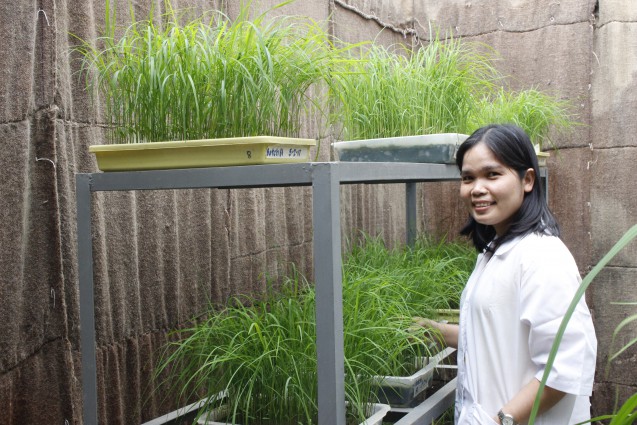 Globally, rice pests and diseases will remain as formidable threats to food production efforts. This means low rice yield for farmers, which translates to heightened poverty incidence and food supply imbalances.
Globally, rice pests and diseases will remain as formidable threats to food production efforts. This means low rice yield for farmers, which translates to heightened poverty incidence and food supply imbalances.
Dr. Jennifer T. Niones takes off from these challenges in doing host-pathogen interaction studies, leading to development of disease resistant varieties. She is a Supervising Science Research Specialist at PhilRice’s Crop Protection Division.
Agri interest
“I knew right away that I will be taking Plant Pathology. I was attracted to the idea that I get to see microorganisms,” she said. In 1999, she finished her bachelor’s degree in agriculture major in Plant Pathology as cum laude.
After working at PhilRice Central Experiment Station for two years, and after finishing her master’s degree in Plant Pathology at UPLB, Dr. Niones worked in PhilRice Midsayap in North Cotabato for six years.
As a researcher, she found it challenging to work in Midsayap especially that research facilities then were not always available.
But it was not all bad, as, on the flip side, the experience gave her the chance to work closely with farmers making her science grounded and relevant.
High-end research
Dr. Niones obtained her PhD in Bioagriculture Science from Nagoya University where she did intensive research on understanding the molecular basis of a symbiotic interaction between a fungal endophyte and its host plant. The study identified a mechanism of host protection conferred by a beneficial fungal endophyte to its host, leading to a better understanding of the endophyte’s role in plant protection and their promise for further practical use in biological control.
Now at PhilRice CES, Dr. Niones is looking at the applicability of her research in plant-microbe interactions on rice. In particular she leads a study on fungal endophytes from rice and their potential in inducing disease resistance in rice.
She also leads a research on characterizing the mechanisms of disease resistance in Philippine traditional rice varieties.
“We are going beyond by answering the whys on the mechanism behind its resistance. We have a lot of traditional varieties that are resistant to diseases such rice blast, bacterial leaf blight, and tungro,” she explained.
“We hope to find novel disease resistance genes among those traditional varieties, so we can incorporate them in our modern varieties. The importance of this is that we are working on our own materials and we can do that here in PhilRice ”, she said
Currently, she is leading seven research studies in collaboration with local and international partners.
When it comes to disease management, she argues that host resistance is the most effective, economical, and environment-friendly.
UK, PH-funded research
Among her ongoing research studies is on detecting the presence of virulent pathogens and making a simplified and real time monitoring approach to determine where in the Philippines that novel resistant varieties can be planted to maximize the durability of varietal resistance.
While there are existing ways to check the effectiveness of resistant varieties on field, they are tedious to perform and are expensive, Dr. Niones explained.
The approach that her team is working on combines modeling and field monitoring.
“We, at PhilRice, don’t settle to doing very basic studies. We combine published results and what we, thus far, know to advance our knowledge and eventually develop practical disease management technologies, ” said Dr. Niones.
Dr. Niones’ collaborators are from Rothamsted Research (UK), lRRl (Philippines) and Kasetsart University (Thailand).
Hopes
The complexities of doing research are both a boon or a bane for researchers.
For Dr. Niones, she keeps her hopes high on discovering novel resistance genes so varieties can high a strong fighting stance against pests and diseases. At some point, this task is painstaking and does not always yield good results. Nonetheless, it is the gold mine in what she does.
Just like most researchers, Dr. Niones hopes that her research studies will be very useful for farmers in the future, and not just end up in journal databases. (Allan C. Biwang, Jr.)




